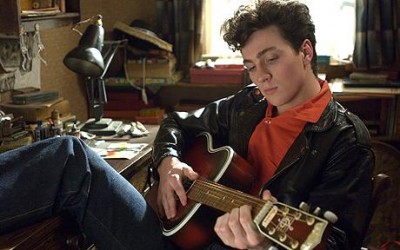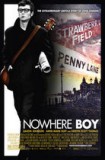| Reviews & Columns |
|
Reviews DVD TV on DVD Blu-ray 4K UHD International DVDs In Theaters Reviews by Studio Video Games Features Collector Series DVDs Easter Egg Database Interviews DVD Talk Radio Feature Articles Columns Anime Talk DVD Savant Horror DVDs The M.O.D. Squad Art House HD Talk Silent DVD
|
DVD Talk Forum |
|
|
| Resources |
|
DVD Price Search Customer Service #'s RCE Info Links |
|
Columns
|
|
|
Nowhere Boy

The story of John Lennon's formative years has been told so many times--both in documentaries (Imagine: John Lennon, The Beatles Anthology, The Compleat Beatles) and fictionalized docudramas (Backbeat, The Hours and Times, The Birth of the Beatles), to say nothing of countless written biographies--that there's some question as to what exactly director Sam Tayler-Wood hopes to add to the mythology with his new film Nowhere Boy. But he finds a fresh take on the material, primarily by focusing on the sticky three-way dynamic between Lennon and the two women who raised him--and how those relationships made him the man he became.
Lennon (played here by Aaron Johnson) was the offspring of a single mother, Julia (Anne-Marie Duff), who left him, at a young age, in the care of his Aunt Mimi (Kristin Scott-Thomas). Free-spirited Julia, who John didn't really come to know until his teenage years, was more of an encouraging friend than an authority figure--that duty fell to strict Auntie Mimi, especially after her husband George died. His unexpected passing is the inciting event of Matt Greenhalgh's screenplay; John falls apart, while Mimi holds her tears and all but scolds him. "It's just the two of us now," she declares, "so let's get on with it, shall we?"
When Julia flits through the edges of the funeral ceremony, John is drawn to her; he misses the camaraderie of Uncle George, and finds something of a substitute in hanging out with his "mum," though their interactions are sometimes awkward, and her displays of affection are often wildly inappropriate. But they filled an emotional need in each other, even if her reappearance in his life would eventually open old wounds and prompt the asking of unanswered questions.
The primary question to be asked of one of these pre-histories is whether the story is compelling on its own terms--that is, would we care about these three people if one of them hadn't grown up to be John Lennon? Nowhere Boy basically passes that test. The complexities of the John-Julia-Mimi triangle are rich with familial drama--how the two women fought over him (Mimi warns her nephew, "She'll hurt you, you know that, don't you?"), and how he frequently played them against each other--even if the climax is a tad overwrought, amping up the melodrama to somewhat soapy levels.
But beyond those basic concerns, the picture subtly but adroitly imparts the emotional toll of Lennon's experiences, and how those moments can shape one's perceptions and relationships forever--how they engender the kind of difficult duality that would end up creating works like "Norwegian Wood" or "Girl" or "I'm So Tired," to say nothing of the howl of pain ("Mother") and murmur of wistfulness ("Julia") that his mum directly inspired.
There's plenty more for Beatles fans than those tenuous psychological links; it's full of little dog whistles, background locations (early in the film, Lennon bikes past Strawberry Fields, while a late scene is staged outside of the Cavern Club) and visual cues (Taylor-Wood's opening scene apes the clanging chord and iconography at the top of A Hard Day's Night), in addition to its tantalizing glimpses of the birth pangs of the group. The details are thankfully accurate (Paul did indeed audition for the Quarrymen by playing "Twenty Flight Rock," and George played "Raunchy" for his, as he does here), but more than that, the film captures the spirit of the Lennon-McCartney partnership. In just a few scenes, it serves up a tight little encapsulation of the rapport between John and Paul (ably played by baby-faced Thomas Sangster)--how their differing temperaments offset and complimented each other.
As Julia, Duff conveys a delicate fragility that is striking; it's a nuanced, multi-layered bit of work. Scott-Thomas is unsurprisingly brilliant, getting both Mimi's steeliness and the warm but hurt heart underneath. Johnson, meanwhile, shows a charisma and likeability that was altogether lacking in his titular turn in Kick-Ass, and he's got Lennon's vocal patterns down cold. But he's also got his prickly personality--by all accounts, John could charm and inspire, but he could also be spitefully, hurtfully mean. By about the 20-minute mark, it's no longer a John Lennon imitation; the film makes the idol real, flesh and bone, a snarky teenage boy overflowing with pain and angst. It recalls what Peter Guralnick's brilliant Elvis Presley biographies set out to do: to, as he wrote, rescue the icon "from the dreary bondage of myth, from the oppressive aftershock of cultural significance," and "to keep the story within 'real' time." In its best moments, Nowhere Boy does that, and maybe a little more besides.
Jason lives in New York. He holds an MA in Cultural Reporting and Criticism from NYU.
|
| Popular Reviews |
| Sponsored Links |
|
|
| Sponsored Links |
|
|
| Release List | Reviews | Shop | Newsletter | Forum | DVD Giveaways | Blu-Ray | Advertise |
|
Copyright 2024 DVDTalk.com All Rights Reserved. Legal Info, Privacy Policy, Terms of Use,
Manage Preferences,
Your Privacy Choices | |||||||











